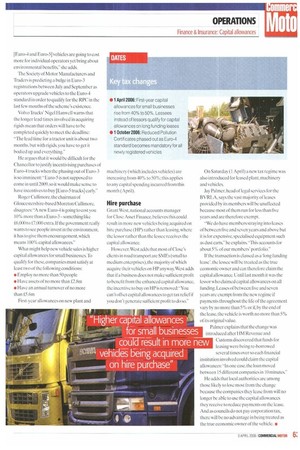[Euro-4 and Euro-5] vehicles are going to cost more for individual operators yet bring about environmental benefits," she adds.
Page 65

If you've noticed an error in this article please click here to report it so we can fix it.
The Society of Motor Manufacturers and Traders is predicting a bulge in Euro-3 registrations between July and September as operators upgrade vehicles to the Euro-4 standard in order to qualify for the RPC in the last few months of the scheme's existence.
Volvo Trucks' Nigel Hanwell warns that the longer lead times involved in acquiring rigids mean that orders will have Lobe completed quickly to meet the dead]ine: "The lead time bra tractor unit is about two months, but with rigids, you have to get it bodied up and everything."
He argues that it would be difficult for the Chancellor to justify incentivising purchases of Euro-4 trucks when the phasing out of Euro-3 is so imminent: "Euro-5 is not supposed to come in until 2009, so it would make sense to have incentives to buy [Euro-5 trucks] early."
Roger Cullimore.the chairman of Gloucestershire-based Moreton Cullimore. disagrees: "A new Euro-4 is going to cost you 10% more than a Euro-3 — something like £6,000 to £7,000 extra. If the government really wants to see people invest in the environment, it has to give them encouragement.which means 100% capital allowances."
What might help new vehicle sales is higher capital allowances for small businesses To qualify for these, companies must satisfy at least two of the following conditions; • Employ no more than 50 people • Have assets of no more than £2.8m • Have an annual turnover of no more than £5.6m First-year allowances on new plant and machinery (which includes vehicles) are increasing from 40% to 50%; this applies to any capital spending incurred from this month (April).
Hire purchase
Giant West , nationnE accounts manager for Close Asset Finance, believes this could result in more new vehicles being acquired on hire purchase (HP) rather than leasing, where the lessor rather than the lessee receives the capital allowance.
However, West adds that most of Close's clients in road transport are SMEs (small to medium enterprises), the majority of which acquire their vehicles on HP anyway West adds that if a business does not make sufficient profit to benefit from the enhanced capital allowance, the incentive to buy on HP is removed: "You can't offset capital allowances to get tax relief if you don't generate sufficient profit to do so." On Saturday (lApril) a new tax regime was also introduced for leased plant, machinery and vehicles Jay Palmer. head of legal services for the BVRLA, says the vast majority of leases provided by its members will be unaffected because most of them run for less than five years and are therefore exempt.
"We do have members straying into leases of between five and seven years and above hut it is for expensive, specialised equipment such as dust carts." he explains. 'This accounts for about 5% of our members' portfolio."
If the transaction is classed as a 'long funding lease'. the lessee will be treated as the true economic owner and can therefore claim the capital allowance. Until last month it was the lessor who claimed capital allowances on all funding. Leases of between live and seven years are exempt from the new regime if payments throughout the life of the agreement vary by no more than 5% or if, by the end of the lease, the vehicle is worth no more than 5% of its original value.
Palmer explains that the change was introduced after HM Revenue and Customs discovered that funds for leasing were being re-borrowed several times over so each financial institution involved could claim the capital allowances: "In one case, the loan moved between IS different companies in 10 minutes."
He adds that local authorities are among those likely to lose most from the change because the companies they lease from will no longer be able louse the capital allowances they receive to reduce payments on the lease. And as councils do not pay corporation tax, there will be no advantage in being treated as the true economic owner of the vehicle. •
































































































































































































